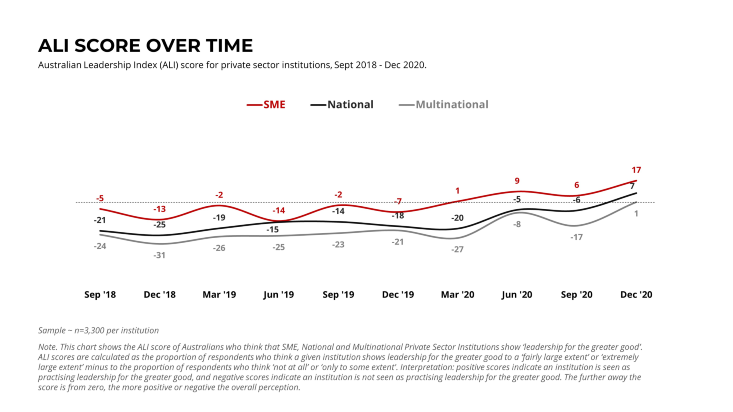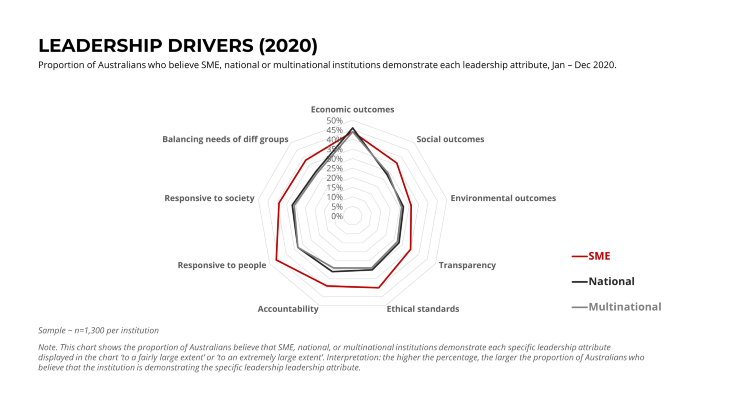
Source: Unsplash/Laura Cros.
Australians believe small and medium enterprises (SMEs) have the potential to drive our recovery post-COVID-19, but a collective effort from government, business and consumers is needed to help them thrive.
The impact on small business
The past 12–18 months have been extremely challenging for most consumer-facing businesses, except for supermarkets, and some home and electronics retailers.
Larger businesses have drawn on resources and government support to adapt, offering new purchasing channels, modes of distribution, and product categories. Some recorded record sales, others continued to pay executive bonuses despite claiming government support schemes.
Lacking these resources, many SMEs struggled to survive, even with government grants and support schemes.
In comparison, where 60% of large businesses are performing well enough to expect to hire new staff in the next three months, this is only true for 33% of small businesses. Unsurprisingly, small businesses were twice as likely to be concerned about surviving 2020 than larger companies.
While government support has allowed some SMEs to continue operating, support schemes alone are not enough. Therefore, we need a collective effort from governments, SMEs themselves, and consumers, to lead Australia’s economic recovery.
The contribution of small businesses
A whopping 99.8% of Australian businesses are classified as either small (fewer than 20 employees, or less than $10 million revenue) or medium (20–199 employees, over $10 million revenue) enterprises. These businesses contribute significantly to Australia’s economy, employment, and sense of community, and are crucial to Australia’s recovery, yet the challenges faced by these businesses are often overlooked.
Our Australian Leadership Index research reveals SMEs are seen as providing more benefits to Australian society than national or multinational businesses.
This is reflected in the ALI Score (an overall measure of leadership for the greater good), which increased throughout 2020 as consumers realised the value small businesses bring to the local community.


Not only do consumers believe SMEs contribute to positive economic outcomes, which are comparable to national and multinational companies, they also see SMEs as providing additional value by creating positive social and environmental outcomes.
Compared to larger companies, Australian’s believe SMEs are more transparent, ethical, and accountable, as well as being more responsive to the community and balancing the needs of various community subgroups.
Overall, intermittent lockdowns during the COVID-19 pandemic have generated positivity in relation to SMEs. Consumers miss the personal connection with local businesses, show a sense of sympathy towards the hardship suffered by SMEs, and are grateful for the contributions of SMEs to the economy, employment, and community.
Get SmartCompany FREE to your inbox every weekday.
This is now reflected in consumers perceiving greater benefits from small business than larger national or multinational businesses.


Supporting small businesses
Government
Multiple discussions have already focused on how governments can support SMEs. Suggestions include continuing financial assistance, encouraging local shopping, and changing procurement processes to favour small business.
While financial support is crucial, governments must provide SMEs with the tools needed to create a sustainable future. Initiatives such as Victoria’s Click for Vic and local travel vouchers encourage consumers to prioritise SMEs, but are not long-term strategies.
Instead, support is needed to help SMEs adapt to the unique challenges of COVID-19, particularly transitioning to online and digital marketing channels.
Online retail sales grew 68% year-on-year in November and accounted for 16.8% of all non-food sales. Large businesses with established omnichannel offers capitalised on this shift, but most SMEs lacked the resources to adapt quickly.
Supporting SMEs to establish a digital presence will provide a sustainable pathway to attract and engage customers.
SMEs
Government support is not enough. It is equally important that SMEs work to create sustainable strategies for themselves, such as adapting products to fit with evolving local community needs.
Alongside the adoption of digital technologies, SMEs must create a compelling reason for consumers to choose them over larger businesses. While SMEs do not have the economies of scale to compete on price, they can look to leverage local connections, close customer relationships, and create unique offerings based on their local knowledge to become embedded in the community.
SMEs should also look to create networks, work together and cross-promote.
For example, after the 2019 bushfires. initiatives such as the social media site Spend With Them were established to provide SMEs with increased exposure. This account now has 187,000 followers, highlighting the benefits SMEs can realise by interacting through digital channels and working with others for joint exposure.
Consumers
The implications for consumers are relatively simple. Where possible, consumers should shop from small businesses in their local community.
While it may not be observable immediately, these choices could have long-lasting impacts on the broader economy and society.
Data from the Australian Leadership Index suggests consumers are increasingly realising the benefits SMEs provide at a community and national level, and it is now time to help them thrive by making the right decisions when it comes to purchasing behaviour.

You must be logged in to post a comment.